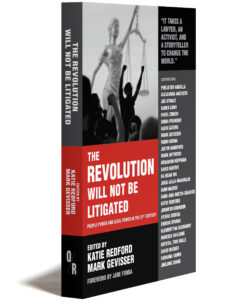Nick Leiber
How can attorneys, activists, and others work together to fight more effectively for social justice? An upcoming panel discussion at CUNY Law School seeks to answer this question as the realities of potential genocide in Gaza, climate crisis disasters around the world, and the gun violence epidemic in the U.S. spark despair, anger, and action. Panelists will share examples of collaboration that made a difference against seemingly intractable problems.
As a law student, I am excited about this conversation because I will be able to hear directly from movement lawyers who have fought the good fight around the globe and can share the good, the bad, and the ugly about what collaboration means in practice. I hope to ask questions about what has and hasn’t worked well for them.
The panel will feature contributors to The Revolution Will Not Be Litigated: People Power and Legal Power in the 21st Century. This collection of 25 essays offers reflections from lawyers and activists on “the complex, and often-awkward dance between legal reform and social change,” the book’s website explains. Its thesis seems to be that the relationship between movement-building and legal strategy is interdependent, and legal advocacy is just one of many tools to effect change. Harold Hongju Koh, an international law professor at Yale, describes the tension this way: “If you say you want a revolution, this stirring volume teaches what every human rights lawyer learns the hard way: lasting victories are only won through an ‘inside-outside’ game, where lawyers fight in court for what activists fight in the streets.”
The scheduled panelists include Alejandra Ancheita, founder and executive director of the Mexico City-based NGO ProDESC (The Economic, Social and Cultural Rights Project); Baher Azmy, legal director of the Center for Constitutional Rights; Justin Hansford, professor of law and executive director of the Thurgood Marshall Civil Rights Center at Howard University School of Law; and Katie Redford, executive director of Equation Campaign and the book’s co-editor. Vince Warren, executive director of the Center for Constitutional Rights and CUNY Law’s 2023-24 W. Haywood Burns Chair in Human and Civil Rights, will lead the discussion.
You can register for the panel discussion on CUNY Law’s website. It’s free! It takes place at CUNY Law in Long Island City on Thursday, Oct. 26, from 6 pm to 8 pm. Registered attendees will receive complimentary copies of the book, while supplies last. (Summaries of all 25 essays are also available here on the book’s website.)
For those who can’t make it to campus on Thursday, we plan to add a link to the video recording of the discussion to this blog post once it’s available. For those who couldn’t make it to the discussion and want to watch it, this is the recording.
Nick Leiber, CUNY Law Class of 2024, is the digital editor of the CUNY Law Review.
